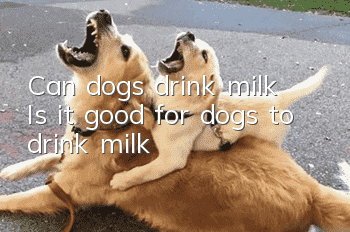Can dogs drink milk? Is it good for dogs to drink milk?

Many people choose to drink milk in the morning to meet their body’s needs. Some people also want to give milk to their dogs. So the question is, can dogs drink milk? Is it good for dogs to drink milk? You need to know Not all foods that can be eaten by dogs are suitable for dogs. Milk is not suitable for dogs to drink. Why?
Reason 1: It can lead to arginine deficiency in the body
According to Vainisi's 1981 animal experiment report, wolf pups that were fed milk for 7 to 10 days completely replaced the diet. Cataracts appeared in the pups when they were fed for 3 weeks. This cataract can be prevented by supplementing arginine, or by feeding the pups to other lactating female wolves or female dogs. The experiment concluded that feeding milk entirely as a substitute for pet diets will produce cataracts, and the cataracts are caused by the lack of arginine in feeding milk.
Reason 2: It can easily lead to lactose intolerance
The name lactose intolerance is no longer an uncommon term. People who have pets have heard it more or less, but they just don’t understand the principle and always feel that their dogs are fine. In fact, as long as you eat food that your body is intolerant to, you will have a reaction, but some are obvious, and some are not obvious after suppressing it.
Let me first explain to you what lactose intolerance means:
There are two ways that carbohydrates are metabolized in pets' bodies, one is glucose metabolism, and the other is volatile fatty acid metabolism. Milk contains high levels of lactose, and pet dogs generally lack lactase in their bodies! Lactose intolerance is prone to occur (term explanation: lactose intolerance). When unbroken and absorbed lactose enters the colon, it is fermented by bacteria present in the intestines into small amounts of lactose. Molecular organic acids such as acetic acid, propionic acid, butyric acid, etc., and produce some gases such as methane, H2, CO2, etc. Lactose that has not been absorbed or has not been decomposed can cause bowel sounds, bloating, abdominal pain, gas, and indigestion. Symptoms such as comfort and diarrhea.) Therefore, pets cannot fully digest and absorb lactose after drinking milk, so they will experience diarrhea, bloating and even vomiting. Therefore, it is recommended that everyone try not to feed milk to pet dogs.
So if you can’t drink milk, is there no other way to replace it? Here are two solutions for you, which can be safely and safely fed to pets. Since you know that milk can cause discomfort to pets, please avoid wrong feeding methods!
Solution 1. Fermented milk yogurt
It is also a dairy product, but 20% to 30% of the lactose in fermented milk has been degraded and is easier for pets to digest and absorb than milk. Therefore, you can choose yogurt with lower lactose for your pet to drink, which can improve the indigestion caused by lactose. The smell of yogurt is loved by most pets. Especially for pets in the young stage, feeding yogurt is nutritiousThe value is far greater than milk.
Solution 2: Goat milk
The benefits of goat's milk have been hyped by various businesses. Goat's milk is indeed very good, because goat's milk has lower protein and lactose content than cow's milk, and is rich in ATP (noun explanation: adenosine triphosphate ATP, adenosine triphosphate is based on hypoxanthine Adenosine triphosphate is a high-energy compound produced through biological fermentation technology as a substrate. It is the direct source of energy required for all life activities of tissue cells in the body. It is known as the "molecular currency" of intracellular energy, storing and transmitting chemical energy. It is required for the synthesis of proteins, fats, sugars and nucleotides. It can promote the repair and regeneration of various cells in the body, enhance cell metabolic activity, and is highly targeted in the treatment of various diseases.)
Adenosine triphosphate can promote the decomposition and conversion of lactose, so it is less likely to cause "lactose intolerance" after feeding. At the same time, goat milk contains high levels of vitamin E, which is also a natural antioxidant for pets. It can scavenge free radicals in the body, delay cell aging, and enhance immunity. It can be seen that the advantages of goat milk are much higher than that of cow milk, and it is more suitable for feeding to pets.
- How to train Teddy puppy? How to train Teddy dog!
- Dog fracture symptoms
- How many puppies can a Shiba Inu have at one litter? Dog breeding!
- How does a novice train a dog to fetch a ball? What is the appropriate size of a dog training ball?
- How many shots do golden retriever dogs need to be vaccinated?
- Can dogs prevent pregnancy by taking birth control pills?
- Can dogs eat vitamin e?
- Can pet dogs eat leftovers?
- Why do dogs eat grass?
- What is the reason why puppies have a lot of eye droppings?



